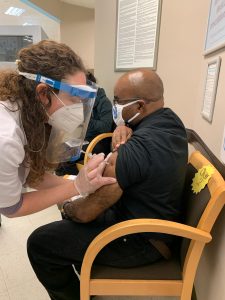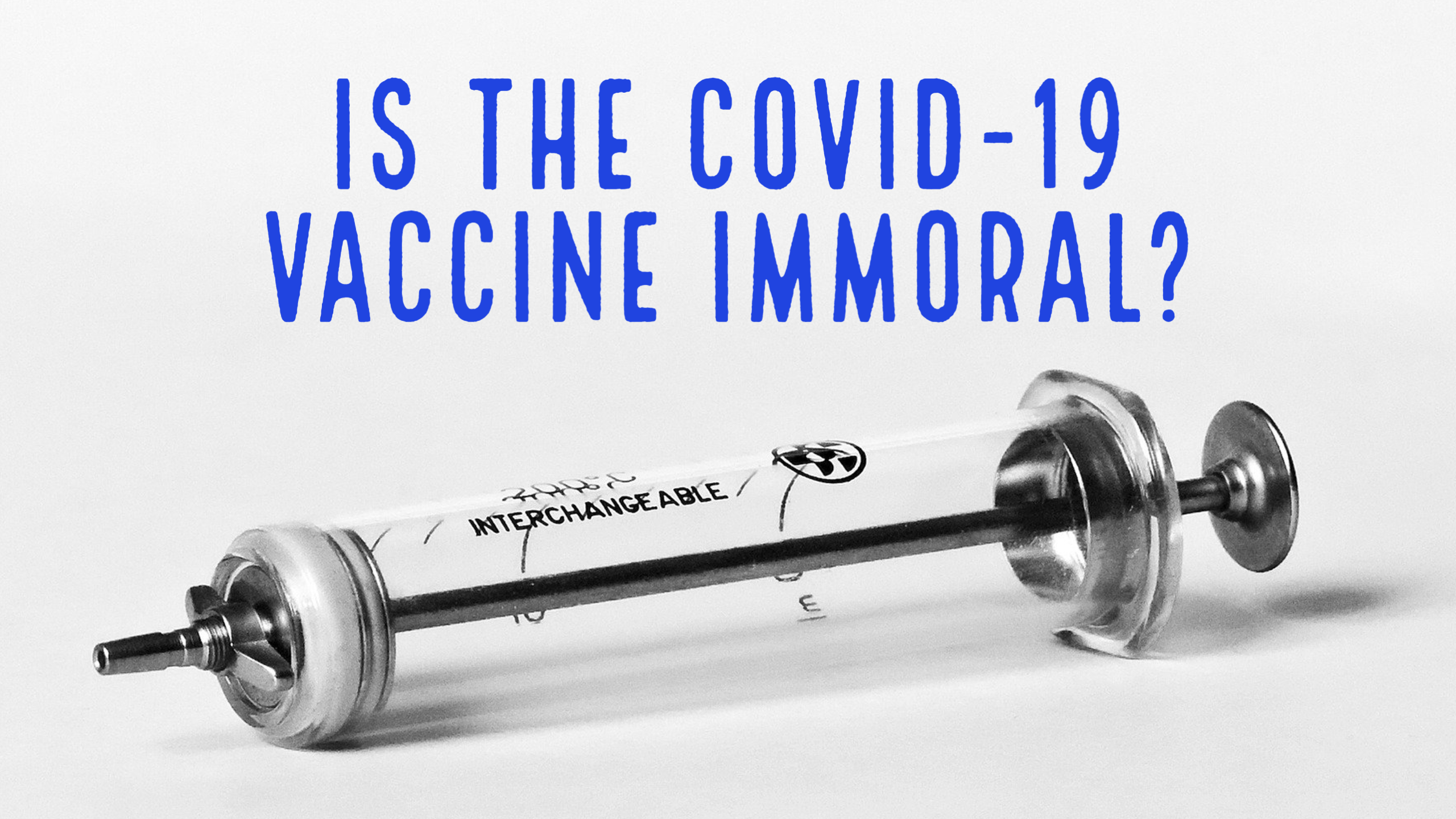Is it Immoral to Receive Covid-19 Vaccines?

Usually the topics I cover in our CCM In-Depth video series come from questions students ask me. If I have several students asking the same sort of question, I figure that’s a good topic to address because other people are probably wondering about the same thing. And it’s no surprise that lately a lot of people have been asking about the Covid-19 vaccines and whether or not Catholics ought to get vaccinated. The Covid vaccines are big in the news, the government is working hard to make sure the vaccines get distributed and administered to as many people as possible, and our university has opened up a regional clinic to help in this effort. How soon we can get back to some degree of normalcy depends upon having a large percentage of the population vaccinated against the coronavirus.
Why would there be moral concerns about taking a vaccine that has the potential to save lives and end this pandemic? It’s because some Covid-19 vaccines utilized fetal cell lines obtained by abortion in production, testing or both. Since abortion is a moral evil, the question arises, is it morally permissible to benefit from a vaccine that was developed using immorally obtained material?
Not new with Covid
This concern is not unique to the Covid-19 vaccines. Many vaccines developed in recent decades have utilized fetal cell lines that resulted from abortion. This has been public knowledge since the 1990s. Tissue from certain fetuses aborted in the early 1970s has been used to create cell lines that can be reproduced indefinitely. These cell lines are then used for research and development, and in some cases, even in the production stages of vaccines. The Church has had ample time to look into the situation to understand what moral principles are in play and offer guidance for the faithful, so the guidance the Church is offering regarding the new Covid-19 vaccines are not rushed answers. We’ll look at what the Church is saying in a moment, but first we need to understand the moral principles involved.
Degrees of Cooperation with Evil
Something important to keep in mind is that by virtue of the fact that we live in society and interact with people in many ways — and people sin — we all to some degree or another cooperate with the sins of others. The question is, to what degree can I cooperate with the evil of another before I become complicit in that act? In other words, when do I begin to share in the guilt of that evil? The Church articulates a couple of principles of moral philosophy (which are not unique to the Church) to help us navigate this question.
First a distinction is made between “formal” and “material” cooperation. Formal cooperation is when you cooperate with the evil action of another because you agree with that evil and want to participate in it. It is a willing and intentional cooperation. In this case you share in the guilt of that evil act, even if you are not directly involved in the act itself. Using abortion as our example, let’s say you drive a friend to an abortion clinic because you agree with her decision to have an abortion. Even though you are not performing the abortion itself, you are formally cooperating with that action and so share in the culpability, or moral responsibility, for that action. The Church teaches that it is never morally permissible to formally cooperate in evil.
The other category would be material cooperation with evil. This describes any situation in which our actions may contribute in a positive way to the evil action of another, even though we do not assent to that evil. Material cooperation can be proximate (near) or remote (far). Proximate material cooperation would be something like driving your friend to the abortion clinic, even though you don’t agree with her decision. Let’s say she simply asked you to drop her off downtown, a block away from the clinic, because she knew you would not agree with her decision to have an abortion. You are still materially cooperating with that act in a close, or proximate, way, but without the intention to do so. An example of more remote material cooperation would be if you installed the engine in the car that was used to drive someone to the abortion clinic. You still contributed to the action, but at a great distance.
Receiving a vaccine that was created using cell lines from aborted fetal tissue would constitute remote material cooperation with the evil of abortion. Material cooperation itself does not incur guilt. Proximate material cooperation should be avoided as much as possible, especially in the case of grave evils, but material cooperation with evil can be tolerated for sufficiently grave reasons, especially when the connection is remote.
The Ends Don’t Justify the Means
Another moral principle that might seem to come into play in this case is the ends don’t justify the means. What we mean by this is that it is never permissible to do evil hoping that good will come from it. The argument here is that even though the abortion in question happened decades ago, it would be wrong for us to derive benefit from it, because you can’t do evil in order to achieve a good. But that’s not really what’s going on in the question of using vaccines derived from fetal cell tissue.
Let’s look at a related example. Let’s say one of my children was dying of kidney failure and a transplant would save his life. It would not be morally permissible for me to murder someone to take their kidney, even if I have the good intention of saving my son’s life. The ends don’t justify the means. But that doesn’t mean I can’t use a kidney from someone who has died otherwise — even if that person was a murder victim. The fact that I’m using a murder victim’s kidney to save the life of another person doesn’t make me complicit in the murder. In fact, it might bring consolation to the victim’s loved ones to know that some good has come from the loss they have suffered. Likewise, simply receiving a vaccine does not make you complicit in the abortion that gave rise to the cell lines used to make the vaccine.
The Church Teaches – Part 1
In 2008, the Congregation for the Doctrine of the Faith issued a document called Dignitas personae, or “on certain bioethical questions,” that dealt with this specific issue. The Congregation for the Doctrine of the Faith is the authoritative body in the Vatican that deals with moral and theological issues. They considered this situation from a few different perspectives.
The first is that the bodies of aborted fetuses, like any human body, must be treated with dignity and respect. This does not mean that human remains can never be used for medical or research purposes. It is permissible, for example, for a Catholic to be an organ donor. But it is unethical to harvest the organs or tissue of a person without their consent. So using the tissue of an aborted fetus for medical research is itself unethical.
The second consideration is that of scientists who may discover that the material they are using for research was obtained unethically in this way. The Vatican says that scientists have a moral duty to remove themselves from such research, even though they were not complicit in the original abortion.
The third consideration is that of the recipient of vaccines developed from such research. For the good of people’s health, the Vatican says that such vaccines may be used, while noting that people have a duty to voice their objection to the healthcare industry and to ask that vaccines be developed in ethical ways.
Covid Connection
That was in 2008, so obviously well before Covid-19. Let’s see how all this applies to the Covid-19 vaccines that are available or in development now. Not all of them have the same connection to abortion. For example, the Moderna and the Pfizer vaccine both utilized cell lines deriving from a fetus aborted in the 1970s during certain stages of their testing, but the vaccines themselves are not produced using aborted fetal cell lines. By contrast, the Johnson & Johnson vaccine is actually made from cell lines derived from an aborted fetus and so is much more morally problematic than these others.
I mention these three in particular because these are the three available in the US today. There are hundreds of Covid-19 vaccines in development. Some of these have no connection with aborted fetal cell tissue at all. Some utilize fetal remains only in certain aspects of the testing process. And some utilize aborted fetal remains extensively in the testing process as well as in the manufacturing process. The National Catholic Bioethics Center links to a report put together by the Charlotte Lozier Institute categorizing all vaccines currently in development according to where they fall in the above-mentioned three groupings. Most of them fall into group one or two; in other words, they either don’t use aborted fetal tissue at all, or only in certain parts of their testing, and so are not as morally problematic as those in group three, which are manufactured with cell lines derived from aborted fetal tissue.
The Church Teaches – Part 2
So is it immoral for Catholics to get a Covid-19 vaccine or not? The Church has actually been quite vocal about this. It is not immoral for Catholics to receive a Covid-19 vaccine. And while it is not morally obligatory for Catholics to receive it, the Church strongly encourages Catholics to do so not only for their own health but for the protection of vulnerable people in society.
For example, in a December 2020 statement issued jointly by the chairmen of the United States Conference of Catholic Bishops Committee on Doctrine and Committee on Pro-Life Activities, they conclude:
Given the urgency of this crisis, the lack of available alternative vaccines, and the fact that the connection between an abortion that occurred decades ago and receiving a vaccine produced today is remote, inoculation with the new COVID-19 vaccines in these circumstances can be morally justified.
Moral considerations regarding the new Covid-19 vaccines, USCCB
In a January 2021 press release from the USCCB Secretariat for Pro-Life Activities, they similarly say:
Given that the COVID-19 virus can involve serious health risks, it can be morally acceptable to receive a vaccine that uses abortion-derived cell lines if there are no other available vaccines comparable in safety and efficacy with no connection to abortion. If it is possible to choose among a number of equally safe and effective COVID-19 vaccines, the vaccine with the least connection to abortion-derived cell lines should be chosen. If a vaccine with no connection to abortion-derived cell lines is not readily available, vaccines that used such cell lines only for testing would be preferable to those that use such cell lines for ongoing production. Such choices may not be possible, however, especially in the early stages of vaccine distribution. In that case, one may receive any of the clinically recommended vaccines in good conscience with the assurance that reception of such vaccines does not involve immoral cooperation in abortion.
Answers to Key Ethical Questions About COVID-19 Vaccines, USCCB
That’s the US Bishops. What about the Vatican? In a statement released last December by the Congregation for the Doctrine of the Faith, with the approval of Pope Francis, the Vatican stated, “When ethically irreproachable Covid-19 vaccines are not available… it is morally acceptable to receive Covid-19 vaccines that have used cell lines from aborted fetuses in their research and production process.” That statement goes on to say:
…the licit use of such vaccines does not and should not in any way imply that there is a moral endorsement of the use of cell lines proceeding from aborted fetuses. Both pharmaceutical companies and governmental health agencies are therefore encouraged to produce, approve, distribute and offer ethically acceptable vaccines that do not create problems of conscience for either health care providers or the people to be vaccinated.
Note on the morality of using some anti-Covid-19 vaccines, CDF
In other words, the moral responsibility lies with the pharmaceutical companies, not the recipients of the vaccine.
Regarding those who choose not to be vaccinated, the Congregation for the Doctrine of the Faith says:
From the ethical point of view, the morality of vaccination depends not only on the duty to protect one’s own health, but also on the duty to pursue the common good. In the absence of other means to stop or even prevent the epidemic, the common good may recommend vaccination, especially to protect the weakest and most exposed. Those who, however, for reasons of conscience, refuse vaccines produced with cell lines from aborted fetuses, must do their utmost to avoid, by other prophylactic means and appropriate behavior, becoming vehicles for the transmission of the infectious agent. In particular, they must avoid any risk to the health of those who cannot be vaccinated for medical or other reasons, and who are the most vulnerable.
Note on the morality of using some anti-Covid-19 vaccines, CDF
Our own bishop, Peter Jugis, has echoed these statements from the Vatican and the USCCB in a recent press release, in which he says:
The moral concern people have is whether they are somehow complicit in an act of abortion by receiving a vaccine developed using cell lines distantly linked to an abortion. In this instance, the answer is no. The Church teaches that a vaccine recipient’s participation in the act of abortion would be passive, material and remote. In other words, someone who receives a COVID-19 vaccine would not be morally complicit in the original act of abortion. Nevertheless, we do have an obligation to speak out against moral evils that have been woven into the fabric of our society, as in this case, the abortions used to initiate some of the cell lines that remain in use today… Whenever possible, it is best to choose a vaccine that is ethically produced, and it is important to note that most of the COVID-19 vaccines in development do not use fetal cell lines at all. Of the three vaccines currently available in this country, the U.S. Conference of Catholic Bishops has recommended, “If one has the ability to choose…, Pfizer or Moderna’s vaccines should be chosen over Johnson & Johnson’s.” This is because the cell lines derived from aborted tissue were used in the production of the Johnson & Johnson vaccine, while the other two vaccines used those cell lines only in some laboratory testing. However, if you aren’t certain you can get access to the preferred options, it is acceptable to get the Johnson & Johnson vaccine given its remote connection to abortion. And the conference of bishops has said getting the vaccine “is an act of charity that serves the common good.”
Bishop Jugis offers guidance on COVID-19 vaccine
Finally, Pope Francis has led by example by himself being vaccinated against Covid-19, as has Pope Emeritus Benedict XVI. So there is no reason to refuse to be vaccinated against Covid on the basis that you are a Catholic.
The Bottom Line
Let’s be clear: Abortion is a moral evil. Respect for the dignity of the human person means that it is morally wrong to use aborted human fetal tissue for research purposes and pharmaceutical companies bear the moral responsibility for that. The public has a duty to voice our opposition to these methods and to encourage those in the healthcare industry to provide ethically produced vaccines. But in the absence of such vaccines, receiving a vaccine with connections to abortion constitutes only remote material cooperation which is permissible for grave reasons, such as protecting the health of vulnerable populations and helping to end a global pandemic.
The bottom line is that no one should have a guilty conscience for receiving the Covid-19 vaccine. In fact, receiving the vaccine can be viewed as an act of charity as it will help protect vulnerable members of society and help bring this pandemic to an end sooner rather than later. Those who choose not to be vaccinated still have a moral duty to otherwise do what they can to prevent the spread of the disease and not put vulnerable people at risk, such as wearing a mask in public, not gathering in large numbers, social distancing, and all the other things we’ve gotten used to doing over the past year.
I hope this overview has been helpful to you in forming your own thinking about these moral questions around the Covid-19 vaccines. I’ll conclude by asking you to join me in prayer for all of the Covid-19 victims, those currently suffering from the illness, for the strength and fortitude of all the healthcare workers in the field and of course we continue to pray for a swift end to this pandemic.


Further Resources
- Must Catholics Refuse a Covid-19 vaccine made with a cell line from an abortion? (Fr. Tad Pacholczyk)
- Points to Consider on the Use of Covid-19 Vaccines (NCBC)
- Covid-19 Vaccine Candidates and Abortion-Derived Cell Lines (Charlotte Lozier Institute)
- Moral Considerations Regarding the new Covid-19 Vaccines (USCCB)
- Answers to Key Ethical Questions About Covid-19 Vaccines (USCCB)
- Instruction Dignitas Personae on certain bioethical questions (CDF)
- Note on the morality of using some anti-Covid-19 vaccines (CDF)
- Bishop Jugis offers guidance on Covid-19 vaccines

